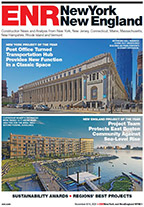
Coastal communities pondering adaptations to climate change and sea level rise now have new software for weighing the costs and benefits of various mitigation strategies.
COAST (Coastal Adaptation to Sea level rise Tool) is free software built on six years of research led by Sam Merrill, director of the New England Environmental Finance Center at the University of Southern Maine's Muskie School of Public Service, in partnership with Blue Marble Geographics, a vendor of geospatial data conversion software. Downloads of COAST are available from the Blue Marble site.
COAST is a proprietary tool built on Blue Marble's Global Mapper Software development kit that works as a stand-alone product. It helps answer questions about actions and strategies—including the probable cost of inaction—to avoid damage to assets from predicted sea level rise or coastal flooding. It overlays geospatial data with the protective effects of measures such as moving or elevating structures or building seawalls, and analyzes the losses prevented compared to cost of implementation. Outputs can be viewed in Google Earth.
"It's an important tool," says Sacha Spector, director of conservation science at Scenic Hudson, a non-profit that advises towns on waterfront issues. "Coastal adaptation is going to be an ongoing challenge throughout this century."



Post a comment to this article
Report Abusive Comment